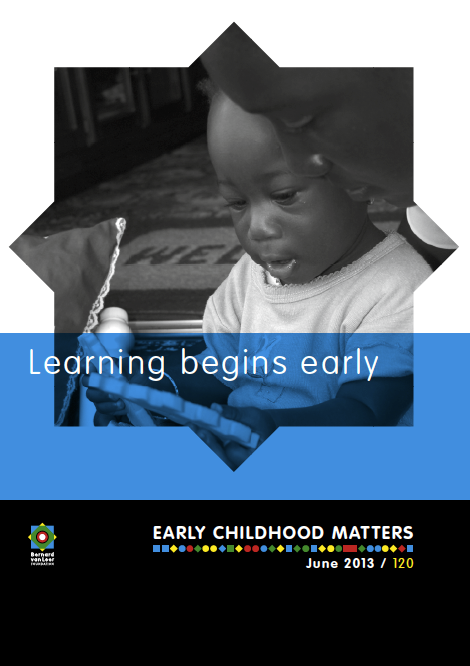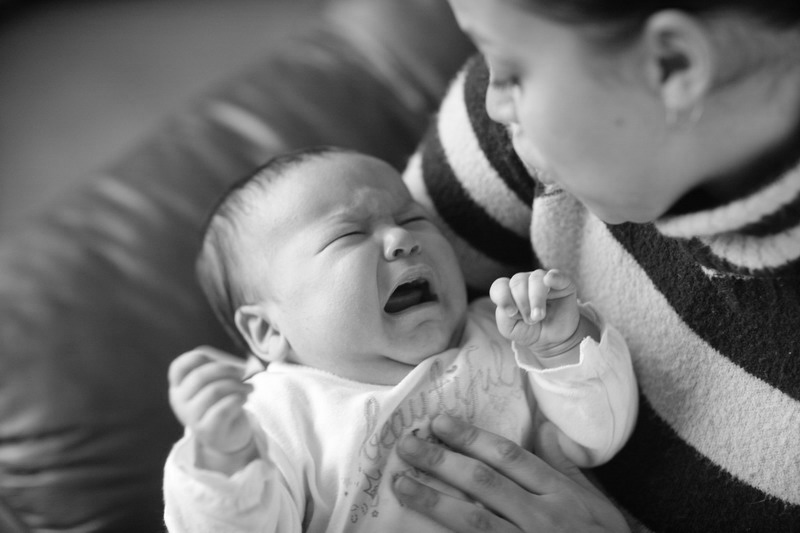Early Childhood Matters Magazine Feature: Health for Learning: The Care for Child Development Package
 In this article, authors Charlotte Sigurdson Christiansen, Chiara Servill, Tarun Dua and Bernadette Daelmans, of the World Health Organization (WHO), introduce the recently released WHO and UNICEF Care for Child Development package.
The package was produced as one of the responses to the United Nations (UN) Millennium Development goals, in which world leaders made commitments to improve the life of poor people around the world in the course of one generation, from 1990 to 2015. “The UN Millennium Development Goals include quantitative targets to improve results in poverty reduction, health, education, gender equality and the protection of the environment.”
In this article, authors Charlotte Sigurdson Christiansen, Chiara Servill, Tarun Dua and Bernadette Daelmans, of the World Health Organization (WHO), introduce the recently released WHO and UNICEF Care for Child Development package.
The package was produced as one of the responses to the United Nations (UN) Millennium Development goals, in which world leaders made commitments to improve the life of poor people around the world in the course of one generation, from 1990 to 2015. “The UN Millennium Development Goals include quantitative targets to improve results in poverty reduction, health, education, gender equality and the protection of the environment.”
The authors refer to the body of research which demonstrates the impact of the early childhood environment on achieving development potential. “Programmes for disadvantaged children that are introduced during early childhood are found to have a greater impact than those introduced at a later stage (Engle et al, 2007).”While progress has been made in reducing child survival and mortality over the past two decades, “more than 200 million children under 5 worldwide do not reach their full development potential”.
“A life course approach is essential to give young children the best start in life and unleash their full developmental potential. At one end of the spectrum, the physiology of foetal growth and factors influencing the embryonic, foetal and postnatal growth trajectory are being uncovered. At the other end, the long-term effects of investing in early childhood development are increasingly becoming clear. Studies have shown that disadvantaged children are likely to do poorly in school and subsequently have low incomes, high fertility, and provide poor care for their children, this contributing to the intergenerational transmission of poverty. (Grantham-McGregor et al, 2007)”…
“During early childhood years, a safe and stable environment, good health, adequate nutrition, responsive caregiving, opportunities for emotional connections and attachment, and stimulation (opportunities to learn) are important to ensure healthy development in the child. In these years, it is important also to address maternal mental health, as this influences the quality of caregiver-child interaction. Maternal depression, including in settings where HIV is prevalent, puts children at special risk of deprivation and inadequate stimulation. In return, interventions to support care for child development positively impact on the caregiver’s mental health and well-being (Engle et al, 2007).”
The article stresses the value of multi-point interventions, delivered collaboratively across the health, education and community-service sectors. “The delivery of various interventions together has proved to have greater effect than when they are delivered alone. In relation to the various delivery mechanisms, the interventions can be delivered by various groups, such as early child development workers, health workers, community health workers, peers and teachers.”

In particular, the authors reference the Care for Child Development package (WHO, 2012). The package is “an evidence-based set of materials developed by WHO and UNICEF, complementing the traditional package of child survival interventions. The intervention is based on the best available evidence of psychosocial stimulation and caregiver-child interaction. It is meant to guide health workers and other counsellors in supporting families to build stronger relationships with their children. The intervention can be used by health and community workers to provide age-appropriate guidance to caregivers of young children for stimulating cognitive, language and social-emotional development through play and communication….The Care for Child Development package provides guidance to caregivers at various stages in the child’s life, from the newborn period up to 3 years. The package includes guidance on stimulation, advice on what to do if the household lacks toys, and guidance on how to deal with cases of maternal stress or where caregivers have little time for interaction with the child. The skills taught affect multiple caregiving practices including infant and young child feeding, protecting a child from imminent harm, and recognizing and seeking care when the child is sick.”
Package materials include a participant manual, counselling cards, facilitator notes, guide for clinical practice, framework for monitoring and evaluation, poster, and cd-rom of resources, available here.
In January 2013, as part of a commitment to intensify its work in the are of early child development, WHO convened an inter-disciplinary global consultation on development across the life course.
“The key messages from the meeting were:
- Determinants resulting in adversities in early childhood are across multiple areas and sectors – such as inadequate nutrition, frequent illness, lack of care and stimulation, poverty, poor environment, poor parental education, violence and conflict.
- To move towards sustainable development and social equity, the child survival and child development agendas need to be intertwined.
- Optimising child development requires a life-course approach with interventions during adolescence, pregnancy and childbirth, the newborn period and early childhood especially up to 3 years of age….
- Intersectoral collaboration, across primary health care, social sectors, nutrition, education and environmental programmes, is crucial.
- Tools are available and experience from large-scale programmes in high-income countries provide important translational lessons for scaling-up similar programmes in low- and middle-income countries.
- Large number of partners and governments are committed to enabling children to thrive.
- It is therefore imperative that all stakeholders work together to advance the early child development agenda and help children get a best start in life and unleash their full developmental potential. (WHO, forthcoming)”
Access this and other great articles here.